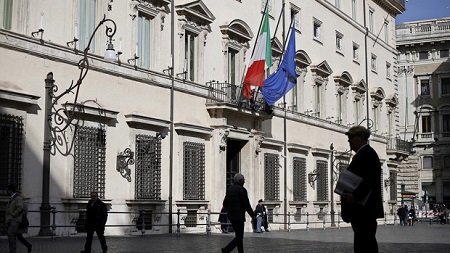 France and Italy will escape immediate punishment over weaknesses in their 2015 budget proposals as the European Union tries to balance the need for continued austerity with a desire for greater investment.
France and Italy will escape immediate punishment over weaknesses in their 2015 budget proposals as the European Union tries to balance the need for continued austerity with a desire for greater investment.
The European Commission, the EU executive in Brussels, will today warn French President Francois Hollande and Italian Prime Minister Matteo Renzi that their governments may face action in March if they do not follow through on written pledges on cutting deficits and making their economies more competitive.
“I insisted in my discussions with Hollande and Renzi that I want to see timetables for these reforms,” commission President Jean-Claude Juncker said in an interview published today in Belgium’s Le Soir newspaper. “These cannot just be promises.”
As the euro-area recovery falters, policy makers are wrangling over whether to ease the pressure on countries to cut debt and deficits or force them to stick to spending rules bolstered during the debt crisis. The commission considered taking immediate action against countries that risked missing targets and decided against it, according to Juncker.
French Finance Minister Michel Sapin said the postponement will allow the EU to see details of the execution of France’s budget. The commission “is taking account of certain realities,” Sapin said yesterday in Paris.
Starting Gun
While the EU cannot dictate the contents of a national budget, it can fire the starting gun on a process to impose fines if governments repeatedly flout debt or deficit targets or take insufficient measures to deal with imbalances.
A failure to push through structural reforms, such as those the EU has demanded from France and Italy, “raises the specter of permanent economic divergence between members” of the currency bloc, European Central Bank President Mario Draghi said yesterday, according to the text of a speech in Helsinki. “This has potentially damaging consequences for all” euro-area members.
The commission earlier this month decided against rejecting any budget outright, saying that none of the euro-area nations was at risk of “serious non-compliance” with EU spending rules, while leaving open the possibility of warning that further measures were still necessary. The decision to put off until March any move toward sanctions is a change to the EU’s timetable for such action.
Effective Action
Countries are required to narrow deficits to within 3 percent of gross domestic product and to reduce debt to 60 percent of GDP. They can ultimately face fines of as much as 0.5 percent of GDP if they do not take effective action, after other factors such as growth potential are taken into account.
The EU, which has already given France an extension to 2015 to meet the 3 percent target, forecasts that the nation’s deficit will widen to 4.5 percent of GDP next year. In 2016, it will have the largest deficit of all euro-zone nations at 4.7 percent, according to EU projections.
Italy committed to adopt additional measures for 2015 to improve its path toward a structural budget balance -- that strips out the effects of the economic cycle -- after the commission last month raised concerns about its draft budget.
The country will bring its structural adjustment to more than 0.3 percentage points of GDP next year, Finance Minister Pier Carlo Padoan said in a letter to the commission.
Italy’s economy is going through one of the “most severe and lengthy recessions in its history,” Padoan said in the letter. “A fourth year of recession is to be avoided by all means.”
The commission at 11 a.m. Brussels time will publish its formal assessments of draft 2015 budgets from all of the countries using the euro, apart from Greece and Cyprus, which are still subject to conditions under their bailouts. The commission will say that seven countries including Belgium are at risk of breaching the EU’s spending rules, Brussels-based newspaper De Tijd reported yesterday.
(Published by Bloomberg – November 28, 2014)